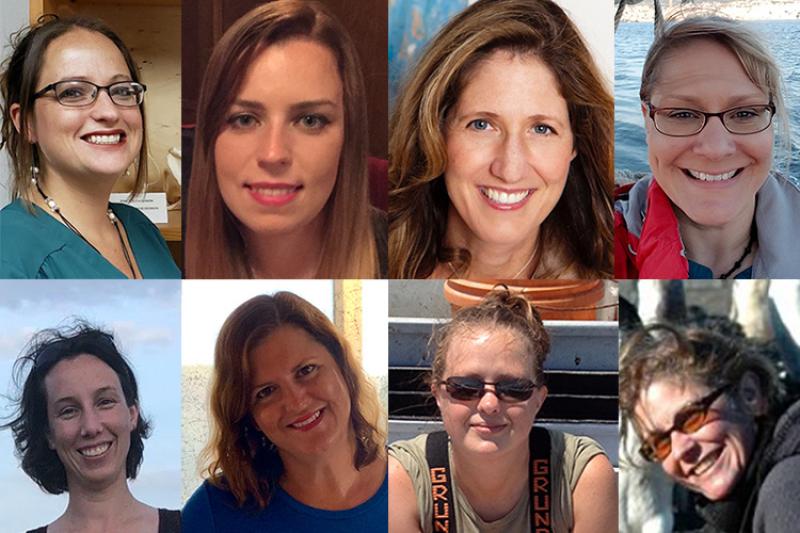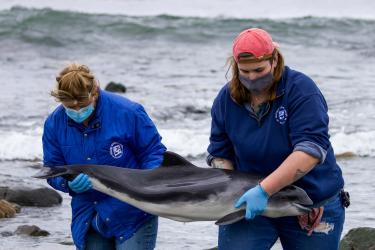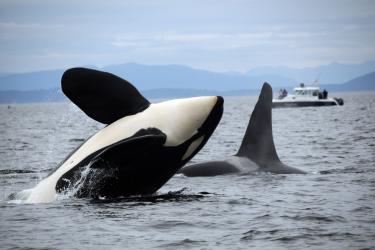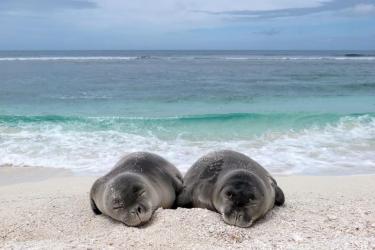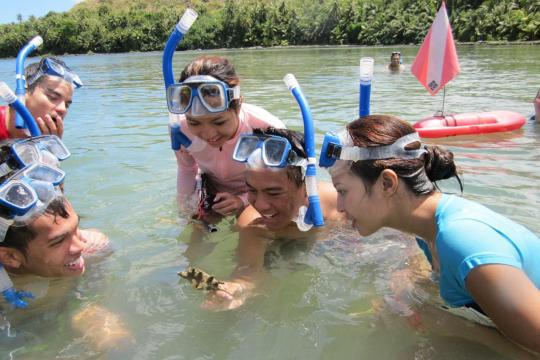This year, to celebrate Women’s History Month, we are highlighting eight women leaders in electronic technologies. We asked them to tell us about themselves and what it means to be a woman in science.
Greater Atlantic

In 2017, she joined the Sustainable Fisheries Division as a member of the groundfish team. Claire collaborates with her colleagues at the Regional Office and the Northeast Fisheries Science Center, as well as industry and nonprofit project partners, to manage two ongoing electronic monitoring pre-implementation programs in the groundfish fishery. She also serves as the electronic technologies liaison for the region.
Fitz-Gerald Quote:
“I believe in maximizing the harvest of our natural resources while ensuring our fisheries are sustainable for the future. Working at NOAA Fisheries allows me to serve industry, and use my knowledge and expertise to impact federal fisheries policy.”
National

Since 2013 the HMS Division has required that seafood dealers use electronic reporting. Jackie leads the HMS electronic data collection system, which includes multiple state and federal partners, for HMS seafood dealers. She has organized and coordinated the integration of electronic HMS reporting requirements into existing electronic reporting programs across multiple regions. Her efforts make use of current technologies to inform management decisions with timely, accurate, and consistent landings data and to monitor and measure the effects of those management actions in real time.
Wilson Quote:
“We have had phenomenal leadership by women at NOAA who have embraced new technologies. Dr. Kathryn Sullivan, a former Under Secretary of Commerce for Oceans and Atmosphere and NOAA Administrator, gave a keynote address that still resonates with me today. She said, ‘We live in an era of finite resources with an ever increasing demand for them. However, unlike any other time, we now have the capabilities and technologies to monitor, measure, and react to conservation and management needs in real time.’ Such leaders exemplify strong, intelligent, and informed leadership, and provide role models to inspire women to pursue scientific careers and powerful leadership positions.”
West Coast

Courtney went on to become a fisheries observer in New England and then moved across the country in 2013 to Portland, Oregon, to work as a data imagery reviewer at the Pacific States Commission. She was instrumental in implementing NOAA Fisheries’ electronic monitoring projects on the West Coast and in Alaska.
Paiva Quote:
“I was raised to see women and men as equals, so I was taken aback when I was in college and a male Ph.D. student told me that being a female will help me with my career in fisheries. I interpreted this as ‘women aren’t as intelligent and useful as men in fisheries, so they are just used for diversity.’ I didn’t believe that statement then, and I don’t believe it now. I have been surrounded by extremely intelligent and successful females for the past 8 years of my career in fisheries. These women have contributed so much to fisheries science, and I am eager to see future generations of women take on a more prominent role in this field.”
National

Laura joined the Office of Sustainable Fisheries in 2017, where her portfolio expanded to include policy development and outreach for electronic technologies as well as legislative analyses. Laura coordinates with the Office of Science and Technology, NOAA Fisheries leadership, regional offices, councils, industry, NGOs, and other partners to develop national policies aimed to improve the guidance, coordination, regulation, and implementation of electronic technologies in fisheries across all regions.
Keeling Quote:
“I grew up in a family of women in the medical field, so I was lucky enough to be encouraged from a young age to explore my interest in the sciences. My passion for environmental conservation and science was fostered through challenging college science courses, and furthered by my first true mentor and boss who is a leader in her field of biogeochemistry. Being supported by, and shown examples of, strong women in the sciences throughout my education and personal life helped me see all the possibilities out there for me to pursue. I am given confidence in women making important contributions to technological advances in sustainable fisheries management from the increasing presence and leadership roles of women I work with in the field, lab, and office.”
Southeast

Heather is also the project manager for developing a tablet application for at-sea data collection. Use of tablets allows for real-time quota monitoring and reduces transcription errors through in-app validations, while also minimizing costs associated with paper forms and data entry time. She recently worked on an electronic monitoring project, testing the feasibility of using video cameras for documenting protected resource interactions with commercial shrimp trawling vessels. Heather is also co-leading the development of a barcoding system to improve sample tracking across database platforms.
Moncrief-Cox quote:
“Commercial fishing is a nearly all-male field, so being able to break down walls and prove my capabilities as a female scientist has always been my top goal. The greatest compliment I could receive leaving a vessel was being told by the captain I was welcome back anytime, something I accomplished quite a bit over the years. Although I’m now in a female-dominated office, maintaining that kind of respect with stakeholders and coworkers is still a priority. Being successful in a STEM field is about proving your strengths to yourself as much as it is proving them to others.”
Northeast

Working with the Data Management Systems Division at the Science Center, Erin supported the deployment of the first observer at-sea data collection program with Wi-Fi connectivity to facilitate timely transmission of the data upon landing. In 2014, she supported development of a rugged tablet with a native Android application designed and written to be target device–independent, permitting ease of deployment for future generation platforms. Since then, Erin has been collaborating with other U.S. observer programs to discuss their unique electronic reporting requirements.
Kupcha Quote:
“There was always a strong contingent of women in the STEM classes in high school and in undergraduate and graduate courses that I attended. The diversity of people that I met during this time taught me that STEM is a common language and connection in all cultures.”
Pacific Islands

Dukes Quote:
“Growing up, it never occurred to me that men and women weren’t on even ground regarding career choices or opportunities. It was always instilled in me to dream big and do what fuels you to be successful and kind no matter what your gender. Landing in a field that was traditionally male dominated, I was surprised by some of the challenges I’ve encountered. Over the years, however, I’m finding that a shift is occurring, and with more women in leadership and management roles it’s both encouraging and promising for future generations. In our current global climate both politically and environmentally, science is becoming increasingly important, and I’m moved by and hopeful about the dialogue occurring within our younger generations.”
Alaska

Suzanne’s current project includes strong collaboration among the Pacific States Commission, Alaska Fisheries Science Center, University of Washington, North Pacific Fishery Management Council, and Alaska fixed gear fleet. She designs and fabricates the hardware systems of electronic monitoring data collections, which include the microcontrollers and the sensors they read, and the machine vison cameras and computers, all of which must be waterproofed for marine environments.
Romain Quote:
“As far as being a woman in science, while I have encountered disrespectful individuals, the majority of fishermen and scientists I have worked with have been inspirational and very bright. I have learned as much from deck crews and captains as I have from my scientist peers. Since this field in particular calls for such a diversity of skills and experience, it truly takes all kinds to complete a mission. One thing I appreciate about my career has been the opportunity to learn new things—from navigation and J-cuts for the Japanese markets; to electronic board design, machine vision algorithms, the physics of sound, the mechanics of photography, and the properties of swim bladders; to how many lobes on the petasma makes for a male krill’s age. It’s a field with so many interesting things to encounter and niches for so many different types of people. The adventurous and driven individuals I have met along way are my tribe, and I am most grateful for finding it.”
